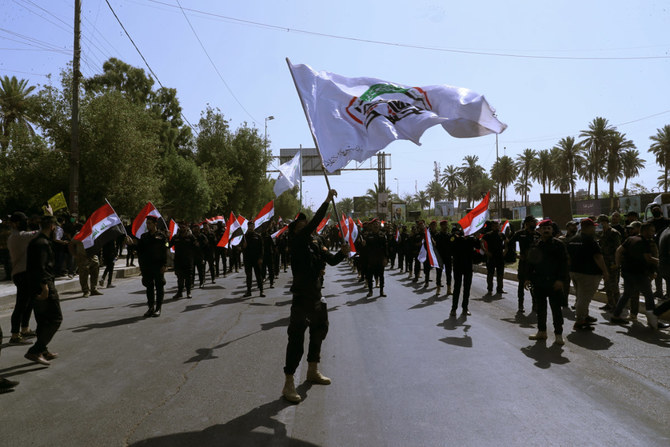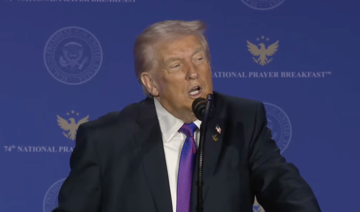BAGHDAD: Iran’s expeditionary Quds Force commander brought one main directive for Iraqi militia faction leaders long beholden to Tehran, when he gathered with them in Baghdad last month: Maintain calm, until after nuclear talks between Iran and the United States.
But he was met with defiance. One of the six faction leaders spoke up in their meeting: They could not stay quiet while the death of his predecessor Qassim Soleimani and senior Iraqi militia commander Abu Mahdi Al-Muhandis in a US drone strike went unavenged.
Militia attacks have only been increasing against the US in military bases in both Iraq and Syria. Three missile attacks in the last week alone resulted in minor injuries, stoking fears of escalation.
The details from Esmail Ghaani’s visit, confirmed to The Associated Press by three Shiite political officials and two senior militia officials, demonstrate how Iranian-aligned Iraqi militia groups are asserting a degree of independence, sometimes even flouting orders from Tehran. Iran now relies on Lebanon’s Hezbollah for support in reining them in, and there is potential that Iran’s new president could play a role in doing the same.
The officials spoke on condition of anonymity to discuss the private meetings.
Iran’s influence, sustained by ideological ties and military support, has frayed because of the US killing of Soleimani and Al-Muhandis last year, because of differing interests and because of financial strains in Tehran. With nuclear talks restarting following US President Joe Biden’s inauguration this year, these differences have come to the fore.
“Iran isn’t the way it used to be, with 100 percent control over the militia commanders,” said one Shiite political leader.
Increasing rocket and drone attacks targeting American troops in Iraq and Syria have alarmed Western and coalition officials. There have been at least eight drone attacks targeting the US presence since Biden took office in January, as well as 17 rocket attacks, according to coalition officials.
The attacks are blamed on the Iranian-backed militias that make up the bulk of Iraq’s state-supported Popular Mobilization Forces. The Biden administration has responded by twice targeting Iraqi militia groups operating inside Syria, including close to the Iraqi border.
“What is taking place now is when Ghaani asks for calm, the brigade leaders agree with him. But as soon as he leaves the meeting, they disregard his recommendations,” said another Shiite political leader.
The loudest of the defiant militia voices has been Qais Al-Khazali, leader of the Asaib Ahl Al-Haq faction, which also maintains a political party. On June 17, only days after Ghaani’s meetings with the militias, he said in a televised address that they would continue to target the US “occupier” and that they will not take into consideration nuclear talks.
“And that decision is an Iraqi one,” he said.
The coalition has formally ended combat operations and reduced troop levels significantly in the last year. Only 2,500 US troops remain in Iraq and discussions are ongoing with NATO to transfer to an advisory mission. Iraq still needs coalition support in surveillance and intelligence gathering and airstrikes against Daesh group targets.
Some argue the ongoing attacks benefit Iran by maintaining pressure on the US.
During talks with Shiite political officials during his visit, Ghani said Iran doesn’t interfere in their political work, but that military matters were different. “These must be approved by the Revolutionary Guard,” one political leader recounted him saying.
Still, Ghaani did not reprimand the militia groups during the meeting. Instead, he told them he understood their concerns.
Iran has struggled to fill in the gap left in the absence of Soleimani and Al-Muhandis, who were commanding figures able to push factions into line and resolve disputes among them.
“Ghaani has a different style and capabilities,” said Michael Knights, a fellow at The Washington Institute. He has a looser framework, establishing broad red lines on some matters, while “other things are ‘don’t ask, don’t tell,” he said.
Along with asking for less, cash-strapped Iran has been giving less as well. Assistance to the groups has been significantly downgraded since US sanctions began crippling Iran’s economy last year.
Divisions among factions have deepened, with growing competition among militias and Shiite politicians.
Ghaani came to meet the militia leaders to mend tensions that were sparked weeks earlier when Iraqi authorities arrested a paramilitary commander, Qassim Musleh, prompting a standoff between PMF fighters and security forces. Ghaani brought a letter from Iran’s supreme leader, Ali Khamenei, criticizing the PMF for its reaction, saying it weakened their position.
To apply pressure on the factions, Iran has come to rely on Hezbollah leader Hasan Nasrallah in Lebanon, a figure the militias highly respect. Almost weekly, various factional leaders hold face-to-face meetings with him in Lebanon, said Shiite political leaders.
Iranian President Ebrahim Raisi, elected in June, also may be a unifying figure for the militias, which hold him in high esteem, political and militia officials said. When Raisi visited Baghdad in February, he met with PMF commanders and told them, in fluent Arabic, “Our flesh is your flesh, and our blood is your blood.” Ghaani communicates with brigade leaders through an interpreter.
“The resistance will grow in power and will see its best of times due to the election victory of Raisi,” said Abu Alaa Al-Walae, commander of Kataib Sayyid Al-Shuhada, in a recent interview.
Keeping up attacks, some Iraq militias challenge patron Iran
https://arab.news/pqm2e
Keeping up attacks, some Iraq militias challenge patron Iran

- Quds Force commander asked Iraq's militia leaders last month to stay calm pending completion of Iran's nuke talks
- One militia commander said they cannot keep quiet while the death of Soleimani and Abu Mahdi Al-Muhandis in a US drone strikes went unavenged
US condemns RSF drone attack on World Food Programme convoy in Sudan’s North Kordofan

- Denise Brown, the UN Humanitarian Coordinator for Sudan, also expresses concern over the drone attack
WASHINGTON: The US has condemned a drone attack by Rapid Support Forces on an aid convoy in Sudan’s North Kordofan state that killed one person and injured three others.
“The United States condemns the recent drone attack on a World Food Program convoy in North Kordofan transporting food to famine-stricken people which killed one and wounded many others,” US Senior Adviser for Arab and African Affairs Massad Boulos wrote on X.
“Destroying food intended for people in need and killing humanitarian workers is sickening,” the US envoy wrote.
“The Trump Administration has zero tolerance for this destruction of life and of U.S.-funded assistance; we demand accountability and extend our condolences to all those affected by these inexcusable events and terrible war,” he added.
The Sudan Doctors Network, on its social media accounts, said the World Food Programme (WFP) convoy was struck by RSF drones in the Allah Karim area as it headed toward displaced people in El-Obeid, the state capital.
The network described the attack as a “clear violation of international humanitarian law,” warning that it undermines efforts to deliver life-saving aid to civilians amid worsening humanitarian conditions across the country.
There was no immediate comment from the rebel group.
The United States condemns the recent drone attack on a World Food Program convoy in North Kordofan transporting food to famine-stricken people which killed one and wounded many others. This follows an attack earlier this week in Blue Nile state that injured a @WFP staff member.…
— U.S. Senior Advisor for Arab and African Affairs (@US_SrAdvisorAF) February 6, 2026
Denise Brown, the UN Humanitarian Coordinator for Sudan, in a statement also expressed concern over the drone attack which hit the aid trucks in North Kordofan.
“I am deeply concerned by a drone attack earlier today on trucks contracted by the World Food Programme (WFP) in North Kordofan, the aftermath of which I came across a few hours later, as I left the state capital, El Obeid.”
“The trucks were en route from Kosti to deliver life-saving food assistance to displaced families near El Obeid when they were struck, tragically killing at least one individual and injuring many more. The trucks caught fire, destroying food commodities intended for life-saving humanitarian response.”
Brown added that “Humanitarian personnel, assets and supplies must be protected at all times. Attacks on aid operations undermine efforts to reach people facing hunger and displacement.”
“Safe and unimpeded humanitarian access remains critical to ensure assistance reaches the most vulnerable people across Sudan.”
Since April 2023, the conflict between Sudan’s army and the paramilitary forces has killed tens of thousands, displaced 11 million and which the UN has described as one of the world’s worst humanitarian crises.
An alert issued by the Integrated Food Security Phase Classification (IPC), confirmed famine conditions in El-Fasher and Kadugli, the capital of South Kordofan, about 800 kilometers to the east.
The IPC said that 20 more areas in Sudan’s Darfur and neighboring Kordofan were at risk of famine.
Of Sudan’s 18 states, the RSF controls all five states in the western Darfur region, except for parts of North Darfur that remain under army control. The army holds most areas of the remaining 13 states across the south, north, east and center of the country, including the capital, Khartoum.
The conflict between the army and the RSF, which erupted in April 2023, has killed thousands of people and displaced millions.















